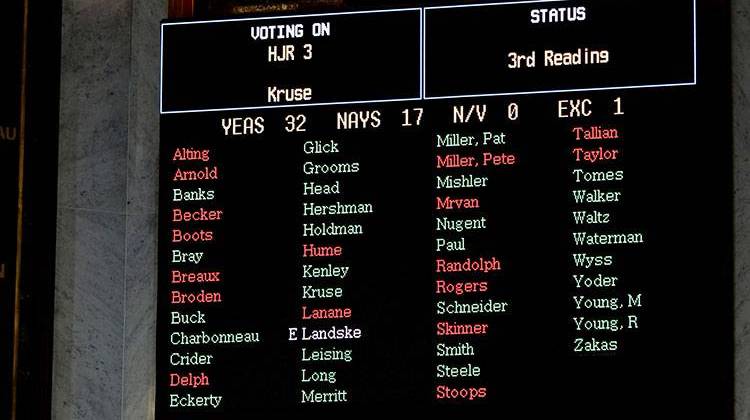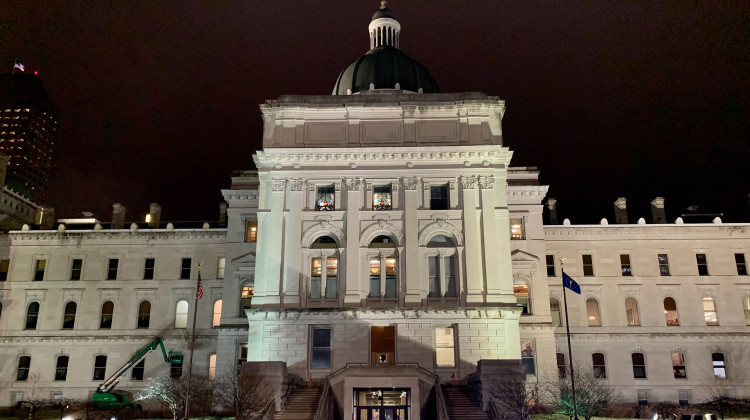The session’s hottest issue fizzled to a close Monday as the Indiana Senate passed a constitutional amendment to define marriage – but without the ban on civil unions that some conservatives had advocated.
That missing second sentence of the amendment means House Joint Resolution 3 will need to be approved again in 2015 or 2016 before it can go on the ballot for ratification by voters. But with public opinion shifting on the issue and courts increasingly ordering states to open their marriage laws, some opponents of the same sex marriage ban say the debate may be all but over.
“We may not have killed this thing completely,” said Jason Burle of Indianapolis, who came with his lesbian sister to the Statehouse to hold up signs during the debate. “But pushing it off another couple years means it’s essentially dead. And getting the second sentence out is a huge thing to us.”
Still, Andrew Downs, director of the Mike Downs Center for Indiana Politics at Indiana-Purdue at Fort Wayne, said Republican leaders will likely face “drastic pressure” to consider the measure again next year.
The Senate voted 32-17, with Democrats making up most of the opposition. A few Republicans voted no, some because they were so disappointed in the decision – made in the Indiana House – to remove the civil unions ban.
Sen. Mike Delph, R-Carmel, said the proposal now does little – if anything – to legally protect traditional marriage. That led him to vote no.
“If we can’t get the marriage amendment to the people now, I’m not convinced we ever will,” Delph said. “And we need to bring this issue to closure.”
Sen. Scott Schneider, R-Indianapolis, told his colleagues that the resolution “is not strong enough” to protect marriage in the courts. But, he voted for it, saying that “at the end of the day, I just cannot bring myself to vote against some semblance of language within our constitution that states that marriage is between one man and one woman.”
Outside the chamber, opponents of the marriage amendment cheered Democrats who spoke against the measure. And after the vote, they declared victory, even as they acknowledged there could still be a fight ahead.
Downs said a strong campaign against the amendment and the “everyday conversations” that lawmakers had with Hoosiers played a significant role in lawmakers’ decisions to dilute the amendment.
“Almost every legislator that changed their vote said there was a conversation that helped to change their mind,” Downs said.
In 2011, the General Assembly approved the amendment with the ban on both same-sex marriages and civil unions. If the identical language had passed this year, the measure would have gone on the ballot for ratification by voters this year.
Instead, the amendment process now begins again.
“We can finally breathe a collective sigh of relief that lawmakers are finished with the amendment this session and it will not appear on the ballot this November,” said Megan Robertson, campaign manager for Freedom Indiana, a coalition of businesses and organizations that opposed the constitutional amendment.
“We are grateful that the deeply flawed second sentence was removed by the House and kept out by the Senate,” Robertson said. “And we encourage Hoosiers to thank those lawmakers who showed the courage this session to make sure Indiana didn’t wind up on the wrong side of history.”
A number of lawmakers invoked history as they debated the amendment Monday. Sen. Greg Taylor, D-Indianapolis, compared the same-sex marriage issue to civil rights battles involving race. Taylor, a black man, said his marriage to a white woman would have been illegal decades ago. He said the younger generation will soon look at the same-sex marriage debate the way lawmakers are looking back now at laws against interracial couples.
“How would you have felt if we were arguing that point today?” Taylor said. “That’s what these kids are going to have to argue if we put this in our constitution. It’s not fair to them.”
And Senate Minority Leader Tim Lanane, D-Anderson, said the amendment will come under fire in the courts regardless.
“We could put this in our state constitution 25 times in bold black capital letters and it will do nothing to preserve it from an attack in federal courts because it violates the United States Constitution equal protection clause,” Lanane said.
But Sen. Jim Tomes, R-Wadesville, said he felt an “obligation” to vote for the amendment.
“It’s a moral issue. It is for me,” Tomes said. “Am I so wrong to let that guide me? I think not. I’m going to answer to the supreme legislator. We all are one of these days.”
John Sittler is a reporter for TheStatehouseFile.com, a news website powered by Franklin College journalism students.
 DONATE
DONATE







 View More Programs
View More Programs

 Support WFYI. We can't do it without you.
Support WFYI. We can't do it without you.